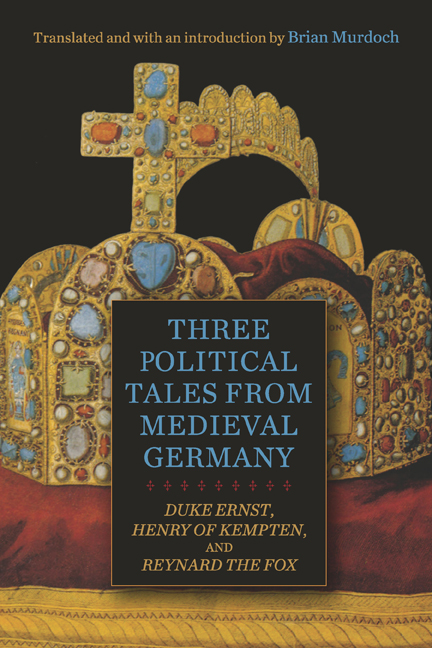 Three Political Tales from Medieval Germany
Three Political Tales from Medieval Germany 3 - The Fox and the Crow
Published online by Cambridge University Press: 09 May 2024
Summary
Reynard was a master of trickery, but today was not a day on which things were going to work out well for him. He now spotted, high above him, a crow called Dizelin, who had cunningly managed to get hold of some fresh cheese, and wicked Reynard was disinclined to let the crow eat it on his own. Accordingly, he applied his mind fully to how he could trick him out of it with a cunning lie. Reynard sat down under the tree in which the crow was about to gobble up the cheese and said: “Is that you, Dizelin! Your old pal is really pleased to find himself in your company—there is nothing in the world that could give me greater pleasure! What I would like most is for you to sing, so I can hear if you are as good as your father, who could really belt it out!”
“Nothing against my father,” replied Dizelin, “but I am happy to say, and can do so without fear of contradiction, that not one of my forebears could sing better than I can.” With that he began to sing, and the entire forest shook with the noise. Reynard begged him to sing one of his own tunes for him. When he started to sing up in the branches, the bird forgot about the cheese. Reynard, however, had no intention of eating it up immediately, even though it had fallen right by his mouth. Let me tell you how the false trickster Reynard plotted the death of the bird, even though he had no need to do so.
“Listen, Dizelin,” he said, “you have to help me, dear friend. You don't know that unfortunately I have a serious problem. Earlier today I hurt myself. That cheese is right next to me, and it smells really strongly, and I’m worried that it might affect the wound I got. My dear friend, help me out. Your father was always very loyal, and they say that you can't water down a good bloodline. You friend could well die, but you could easily do something about it. The stench is really making me suffer.”
- Type
- Chapter
- Information
- Three Political Tales from Medieval Germany<i>Duke Ernst, Henry of Kempten, and Reynard the Fox</i>, pp. 115 - 116Publisher: Boydell & BrewerPrint publication year: 2024
